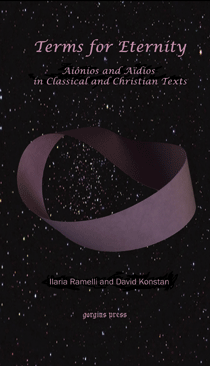
I. Ramelli, D. Konstan, Terms for Eternity: aiônios and aïdios in Classical and Christian Texts
Ilaria Ramelli, David Konstan, Terms for Eternity: aiônios and aïdios in Classical and Christian Texts, Piscataway, NJ: Gorgias Press, 2007. viii, 257 pages.
- ISBN 9781593336943
- $103.00
Recension par B. N. Wolfe (Wolfson College, University of Oxford) dans Bryn Mawr Classical Review 2009.02.16.
Présentation de l'éditeur:
What is truly timeless? This book explores the language of eternity,and in particular two ancient Greek terms that may bear the sense of"eternal": aiônios and aïdios. This fascinatinglinguistic chronicle is marked by several milestones that correspond tothe emergence of new perspectives on the nature of eternity. Thesemilestones include the advent of Pre-Socratic physical speculation andthe notion of limitless time in ancient philosophy, the major shift inorientation marked by Plato's idea of a timeless eternity, and thefurther development of Pre-Socratic insights by Epicurean and Stoicthinkers. From the biblical perspective, the intersection of Greek andHebrew conceptions is reflected in Septuagint, as well as newinflections in popular terminology in the Hellenistic and Romanperiods, and in the role of eternity in the theology of the NewTestament. The profound cross-fertilization of Christian and classicalphilosophical conceptions in the works of the Church fathers and theircontemporaries is explored, bringing the topic into the Patristicperiod. Christian theology in the first five centuries of the CommonEra and its choice of vocabulary prove to be most revealing of largerdoctrinal commitments. Above all debate raged on the question ofeternal damnation versus the idea (deemed heretical in the Christianchurch after the formal condemnation of Origenism) of apocastastisor universal salvation -- that is, the belief that the wicked are notcondemned to eternal punishment but will eventually be included amongthe saved. Terminology for "eternity" is often at the core of how theseissues were debated, and helps to identify which writers inclined toone or the other view of the matter.
Ilaria Ramelli is Assistant Professor of Ancient Philosophyat the Catholic University of Milan. She has many publications and herfavorite area of investigation is the relationship between Patristicphilosophy and classical thought. In ancient philosophy she chieflystudies the Stoic and Platonic traditions.
David Konstan is the John Rowe Workman DistinguishedProfessor of Classics and the Humanistic Tradition, and Professor ofComparative Literature, at Brown University in Providence, Rhode Island(USA). His books include Roman Comedy; Sexual Symmetry: Love in the Ancient Novel and Related Genres; Greek Comedy and Ideology; Friendship in the Classical World; Pity Transformed; and The Emotions of the Ancient Greeks.